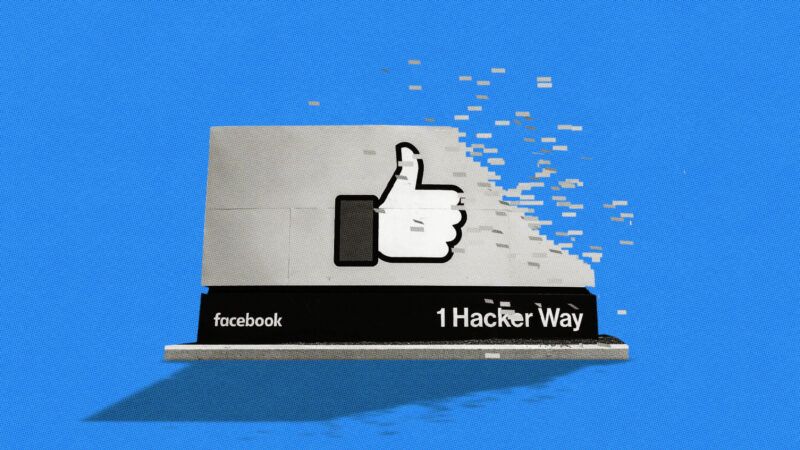Reports of Facebook's Immortality Are Greatly Exaggerated
Critics have said for years that Facebook is a monopoly that can only be killed by federal regulation. Meanwhile, the platform bleeds users, its stock price is plummeting, and it just announced its first-ever round of layoffs.

Last month Elon Musk, the world's richest man, made good on his long-postponed pledge to purchase Twitter. Musk's initial offer in April renewed bipartisan criticism of tech companies. Sen. Elizabeth Warren (D–Mass.) blasted the proposal as "dangerous for our democracy" and called for "strong rules to hold Big Tech accountable."
The episode evokes the many calls over the years to rein in Facebook, one of the other giants of Big Tech. With that in mind, it's worth revisiting some of those doom-and-gloom prognostications and seeing how things turned out.
Not mincing words, in 2019 the Open Society Foundations published an op-ed titled "Facebook's Monopoly Power Threatens Democracy Itself." Referencing founder and CEO Mark Zuckerberg's then-recent appearance before the House Financial Services Committee, the philanthropic organization said the platform "undermine[s] supporting the growth and development of inclusive and accountable democracies." It worried that "the immense and unchecked power of these platforms has become untenable."
Writing in Vice last year, tech activist Evan Greer warned the government, "Restore Net Neutrality, Or Facebook Will Dominate The Internet Forever." Greer called on the Federal Communications Commission (FCC) to reinstate net neutrality, a government regulatory structure that requires internet service providers to treat all online content the same. Without net neutrality, Greer contends, "it's only a matter of time before incumbent giants like Facebook, YouTube, and Amazon cut anti-competitive deals with internet service providers like Verizon and AT&T to prioritize their services, or exempt them from arbitrary (and unfair) data caps." In the absence of federal regulation, "we'll be stuck eating whatever the Mark Zuckerbergs of the world decide to serve up—forever."
In December 2020, the attorneys general of 46 U.S. states, plus Guam and the District of Columbia, filed an antitrust suit against Facebook. Announcing the suit, Colorado Attorney General Phil Weiser said, "Facebook's dominance in the social network marketplace can only be challenged once its anticompetitive actions have been addressed and remedied, thereby enabling both consumers and innovators to benefit from competition."
Such allegations are nearly as old as Facebook itself. Wired contended in 2012, "Troublesome corporate behavior is easier to swallow when there are other choices out there, when you have the option to take your business to another store down the street. But when one company owns the whole street, each little transgression is amplified." The headline wondered, "Can Anything Take Down the Facebook Juggernaut?"
Meanwhile, how have things actually worked out for Facebook in the last few years?
Between 2017 and 2019, while it still added users overall, younger users left the platform in droves: The share of 12–to–34-year-olds using Facebook fell from 79 to 62 percent, leading Forbes to speculate "it's on the road to becoming social media's retirement home."
Facebook whistleblower Frances Haugen's leaked internal documents may have contained very little new information, but they did reveal the company's internal desperation over plummeting user engagement among younger people, the exact same demographic on which it built its early growth.
In October 2021, Facebook's parent company rebranded itself as Meta, indicating its intent to branch out into the virtual reality metaverse. Zuckerberg has signaled a willingness to spend $100 billion or more on the project. In the year since, the company lost half a million users in a single quarter and posted its first-ever quarterly revenue decline, and its stock price has lost nearly 75 percent of its value. This week, Meta announced its first-ever round of layoffs, in which it would cut 13 percent of its workforce and implement a hiring freeze, citing increased expenditures and lower revenues.
Meanwhile, last month the company excitedly announced that virtual reality users' avatars would now have legs, before later admitting that its technology was not leg-ready quite yet.
Tech companies pursue "disruption" as the ultimate goal, completely upending established methods and practices for sleek, modern innovations; Facebook's early motto was "move fast and break things." But disruptions are not permanent. Facebook and the other Big Tech giants achieved massive success chasing a spirit of "innovate or die," but that ethos is a double-edged sword: If those once-revolutionary companies become part of a stodgy establishment, then an enterprising startup pursuing that exact same ethos can supplant them in exactly the same way.


Show Comments (84)